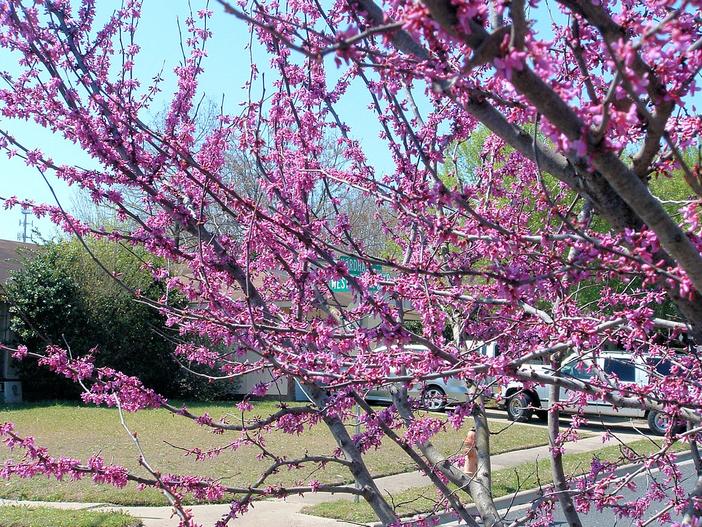Texas Redbud
(Cercis canadensis var. texensis)
Texas Redbud (Cercis canadensis var. texensis)
/
/

micklpickl
CC BY-SA 2.0
Image By:
micklpickl
Recorded By:
Copyright:
CC BY-SA 2.0
Copyright Notice:
Photo by: micklpickl | License Type: CC BY-SA 2.0 | License URL: https://creativecommons.org/licenses/by-sa/2.0/ | Uploader: micklpickl | Publisher: Flickr

























































Estimated Native Range
Summary
Cercis canadensis var. texensis, commonly known as Texas Redbud, is a deciduous small tree or large shrub native to the limestone soils of the Edwards Plateau and the Rio Grande Valley in Texas, as well as parts of northeastern Mexico. It typically grows to a height of 12 feet (4 meters) and a width of 15-20 feet (5-6 meters), featuring a multi-trunked habit with a rounded canopy. The Texas Redbud is particularly noted for its stunning display of pink to deep magenta flowers that bloom profusely on bare branches in early spring before the foliage emerges, creating a striking contrast against the landscape. The heart-shaped leaves are glossy and become yellow in the fall, adding seasonal interest. After flowering, it produces flattened, bean-like seed pods that persist into winter.
Texas Redbud is valued for its drought tolerance and adaptability to various soil conditions, making it an excellent choice for xeriscaping and water-wise gardens. It is often used in urban landscapes, residential gardens, and as an understory tree in larger landscapes. This variety is particularly suited to alkaline soils and can tolerate part shade, although it flowers best in full sun. While it is generally low-maintenance, it can be susceptible to canker diseases and verticillium wilt. Gardeners should also be aware that the seed pods can create litter when they drop.CC BY-SA 4.0
Texas Redbud is valued for its drought tolerance and adaptability to various soil conditions, making it an excellent choice for xeriscaping and water-wise gardens. It is often used in urban landscapes, residential gardens, and as an understory tree in larger landscapes. This variety is particularly suited to alkaline soils and can tolerate part shade, although it flowers best in full sun. While it is generally low-maintenance, it can be susceptible to canker diseases and verticillium wilt. Gardeners should also be aware that the seed pods can create litter when they drop.CC BY-SA 4.0
Plant Description
- Plant Type: Tree, Shrub
- Height: 12-18 feet
- Width: 15-20 feet
- Growth Rate: Moderate
- Flower Color: Pink
- Flowering Season: Spring
- Leaf Retention: Deciduous
Growth Requirements
- Sun: Full Sun, Part Shade
- Water: Low
- Drainage: Medium, Slow
Common Uses
Bank Stabilization, Bee Garden, Bird Garden, Border Plant, Butterfly Garden, Deer Resistant, Drought Tolerant, Fire Resistant, Hummingbird Garden, Low Maintenance, Showy Flowers, Street Planting
Natural Habitat
Limestone soils of the Edwards Plateau and the Rio Grande Valley in Texas, as well as parts of northeastern Mexico
Other Names
Common Names: Oklahoma Redbud
Scientific Names: Cercis canadensis var. texensis , Cercis canadensis subsp. texensis , Cercis reniformis , Cercis texensis , Cercis occidentalis var. texensis , Cercis nitida
GBIF Accepted Name: Cercis canadensis subsp. texensis (S.Watson) A.E.Murray